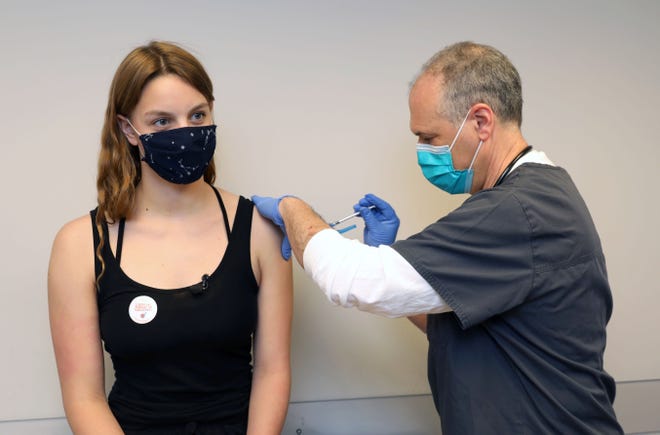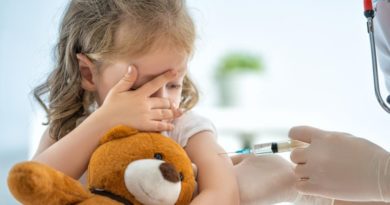Some are hesitant to get the COVID vaccine. Here’s how doctors are convincing them.
For months, doctors worked from the sidelines as New York’s COVID-19 vaccine rollout focused heavily on pharmacies and mass-vaccination sites.
Now they’re playing a key role in convincing their patients — many of whom are hesitant — to step up and get the shot.
Among those doctors is Dr. Sandra Kesh, a Westchester County infectious-disease specialist who says she’s convinced scores of patients to get the vaccine recently.
As authorities shipped more doses directly to Kesh and other doctors, her vaccination pitch to patients steadily added more COVID conspiracy-busting facts. And she finetuned her heartfelt pleas for patients to protect themselves and others by getting the shots.
“It’s about finding out what matters to them,” said Kesh, recalling a recent patient’s fear the vaccine was produced too quickly to be safe.
At first, Kesh offered the woman assurances the historic global focus on finding a vaccine sped up the timeline without sacrificing safety standards.
Then, she explained the patient’s obesity, diabetes and hypertension place her at high risk of severe COVID-19 illness, a threat that could be nearly eliminated if she got vaccinated.
In the end, however, the 68-year-old woman remained hesitant until the conversation turned to family.
“I told her you’re going to potentially expose and infect your grandkids, and she finally changed her mind because of that,” Kesh said.
How NY doctors got in the COVID vaccine game

Kesh’s tale is far from the only vaccine-hesitancy success story as thousands of doctors across New York are now striving to boost slowing vaccination rates, which have dropped about 44% from peaks in mid-April.
Previously, many independent physicians received limited vaccine doses, if any. Millions of doses flowed to larger vaccination sites before waning demand and increased supply prompted a push last month to get more vaccine to local doctors’ offices.
“The mass vaccination sites were a logical first step, but there are second and third steps that have to follow,” said Dr. Joseph Sellers, president of the Medical Society of the State of New York, representing many doctors statewide.
Vaccine: Scratch-offs, beer and more: Here’s the free stuff you can get with your NY COVID vaccine
Community clinics and small pop-up vaccination sites have built upon shots given at massive arenas and stadiums, Sellers said, but the efforts seemed to miss some New Yorkers accustomed to dealing with their doctors.
“Physicians of this state have a long history of building trust with patients as part of vaccinations,” he added. “That’s where we really need to be working now, particularly as we lower the age of eligibility.”

Indeed, as the Pfizer-BioNTech vaccine recently gained approval for ages 12 to 15, doctors aim to help make permanent the state’s precarious return to normalcy. The goal is to vaccinate between 70% and 90% of New Yorkers to starve the coronavirus of vulnerable hosts.
The dire effort comes as the Empire State last week surpassed a milestone of partially vaccinating 10 million New Yorkers, or 50% of the population.
Still, signs of slowing demand for shots included steady declines this month in the seven-day tally of vaccinations, which fell to about 840,000 for the week ending May 16, down from about 1.5 million shots during the peak week in mid-April.
Meanwhile, some experts anticipate vaccinating the rest of society could be nearly impossible, despite desperate attempts nationally to offer everything from free mass transit passes to $5 million lottery tickets as incentives to get shots.
Yet the simple bonds forged between doctors and patients may prove key to achieving herd immunity and defeating the virus.
“There are multigenerational families that I have cared for where there is a great deal of trust, and I have been there for them throughout life’s challenges,” said Sellers, a Cooperstown pediatrician.
“It’s those long-term relationships that I think will make a difference,” he added, noting even some parents who got the vaccine are reluctant to vaccinate their children.
As shots began for adolescents this month, for example, national surveys have shown that between 46% and 60% of parents plan on vaccinating their children against COVID-19. In contrast, about 20% of Americans overall continued to say they are not at all likely to get the vaccine.
When adolescents between 13 and 17 were asked if they wanted to be vaccinated, 51% said they definitely wanted to be and 20% were not sure.
What three NY doctors tell vaccine hesitant patients

Kesh, who is Westmed Medical Group’s deputy medical director, described her attempts to sway unvaccinated patients into getting shots as a mix of medical and personal appeals.
“The thing that gets through the most is my own personal experience: Did I get the vaccine? What was it like? Did I recommend it to my family? That really resonates,” she said.
Her answers, including that her entire family has been vaccinated, are delivered with honesty and frankness. She addresses genuine concerns about rare side effects, while also untangling the mess of misinformation and anti-vaccine lies circulating online.
“It’s about not whitewashing anything. Most of the patients who are vaccine hesitant that come to me have done their research,” Kesh said.
COVID: Breakthrough cases: COVID can still infect the vaccinated, but serious effects are rare
But the temporary pause last month of Johnson & Johnson’s COVID vaccine due to a rare blood clotting condition complicated matters, fueling anti-vaccine disinformation campaign talking points that often found their way into Kesh’s patients’ mouths.
“These reports take on a life of their own,” she said. “They come to me with that fear and it’s very hard to undo that.”
Often, the talks boil down to simplifying risk versus reward. She breaks down the fact that all the vaccines have proven extremely effective at preventing serious COVID-19 illness and death, as the respiratory disease’s death toll surpassed 53,000 confirmed and suspected deaths in New York alone.

“I tell them to weigh the relative extremely low and theoretical risks with the vaccines …and the real, truly observed long-term symptoms of long-haul COVID patients,” Kesh said.
Dr. Eric Levene, a White Plains pediatrician affiliated with Allied Physicians Group, took a similar approach to Kesh when he began vaccinating kids recently.
Responding to parents’ and adolescents’ questions about the Pfizer-BioNTech vaccine, Levene said: “The safety data has shown the side effect profile for kids 12 to 15 is exactly the same for 16 and up and adults; Soreness, achiness, no severe problems have been noted.”
Meanwhile, as more than 160 million Americans have been partially vaccinated, the national push to reach the other half of them has recently added more one-on-one outreach, from advocates knocking on doors to intimate talks in medical offices.
“If we want to really get our hands around this pandemic, we need to get as many people immunized as possible, and I think the best way you approach it is there would be no wrong door to vaccination,” Sellers said.
And now that vaccines are plentiful, more doctors’ offices are becoming one of those doors, rather than the place where patients get information only to be sent elsewhere for shots.
“Anywhere you enter the health system you should be asked, ‘Have you had your vaccine? Why not? Well, we’ve got it, and we can give it to you,’” Sellers said.
Levene expanded on the notion that preventing a lingering threat of COVID-19 outbreaks hinges on getting vaccines to people by any means possible.
“Your trusted (doctor) is really the best place to get the vaccine, but there’s no way we can do it all,” he said. “Mass vaccination sites, other pharmacies are giving the vaccine. Wherever you can get the vaccine, get the vaccine.”
USA TODAY contributed to this report.
Support local journalism
We cover the stories from the New York State Capitol and across New York that matter most to you and your family. Please consider supporting our efforts with a subscription to the New York publication nearest you.
David Robinson is the state health care reporter for the USA TODAY Network New York. He can be reached atdrobinson@gannett.com and followed on Twitter:@DrobinsonLoHud


